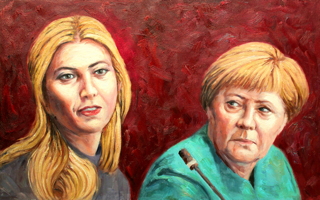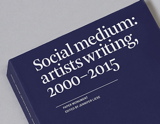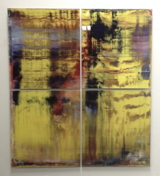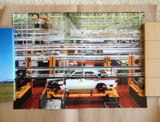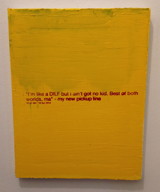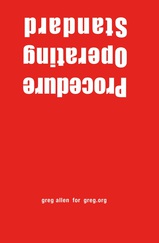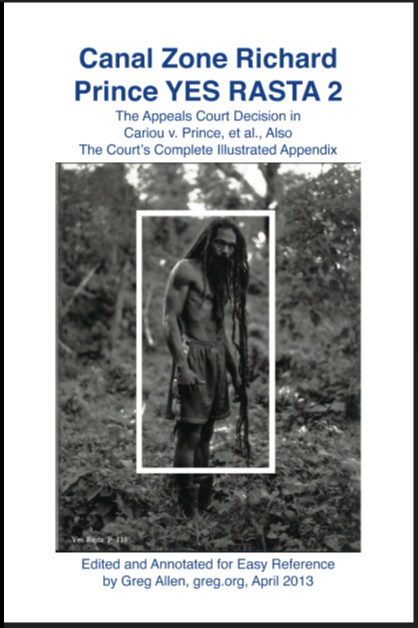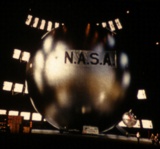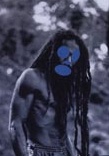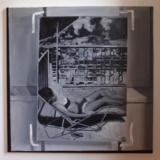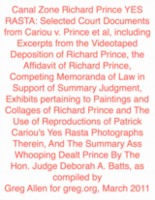No one sends me these, so I have to find them by chance, but I am still interested in the statement-as-question as a form. If the Q&A for panel discussion or public talk *you* experienced was waylaid by such a question, please send me a link.
Last night, while I was experimenting with polishing a painting, I listened to a particularly unsatisfying discussion from the Salon series at Art Basel 2013 titled, "How Is Art History Made?" Moderated by curator Monika Szewczyk, Seth Siegelaub and Adam Szymczyk talked about their Kunsthalle Basel project, which put a series of art world structure-related questions by Siegelaub, translated into six European languages, on posters around town during the fair.
Siegelaub began his remarks by admitting he didn't have any answers, he was just asking the questions, the main one being, basically, is Art History ultimately a history of the market? There was apparently an agreement not to name any artist names, so the discussion remained very general, which is not to say theoretical.
Ultimately, the only satisfying thing was that the panel's question-as-title about a question-as-project led directly to the frustrated audience member's statement-as-question. A woman off camera, unidentified, on the front row, with a Chinese accent, had apparently, and not unreasonably, assumed the officially organized event would answer the question of its title. It had not, and so she had just one simple question.
It begins at 37:00. My interest is to accurately document the experience of the text, so I have preserved grammatical usage. Linebreaks are intended to approximate pauses:
Previously:
Statement-As-Question from Fractures of the Civilization
'I'm Going To Fail,' or Protocols of Participation
OK, I have a very fundamental question.
You mentioned at the very beginning, "What is Art History?" what are the elements that are made up of Art History, and the very fundamental meaning of art, came from 13th century, from different influences, you know, date back to Italian, Latin, and so on, I'm sure you guys are better person to explain this.
So fundamentally, if you check out any dictionary-except the one in Australia, I'm sorry to say-
[Szewczyk: In where?]
Australia. Yes, that one. I'm sorry, she's Australian, in the sense [presumably gesturing to an Australian woman of her acquaintance]
It says that art is defines as something novel, and is, uh, unique, and it must contain skill. So I have checked out not all the dictionaries, but as many as I could. It says all this.
The question is, now, days, does art fit into these three meanings? Also, when you create art, it involve time, and skill, and processes, and a lot of knowledge. That makes art.
Therefore, artist is a contributor. The people who appreciate art, or art lover or whatever you call, is become a person who distribute art because art goes from an artist's hand to an owner's hand, an institution or individual, et cetera, so that information of art is disseminated to his or her surrounding, small, and become a bigger way. Uh, all vehicles of dissemination of information, of course Internet is included.
So now,
the thing is,
you mention just now, when art influence something, the value- it adds value.
Now my silly little question is like this:
With all these things I've just mentioned in the background, and here we are sitting in Art Basel, and if I understood correctly, uh, Art Basel is, if I may call it an establishment, a commercial institution with a lot of cultural value, et cetera,
all the art displayed here goes through a filtering system
Uh, first begin from the artist, then through the dealer, to the committee of the Art Basel, and then collectors, and then- in a sense, it depend on how you look at it, it can be hierarchical, it can be relational,
but, whatever it is, it means, in the end,
some people get here, some people don't get here.
Now, how do you get here? So from my study that I found out, was also very interesting, tied up to this word called 'movement.'
If you have something which none of the people have heard of it, then are you being accepted? So this is a question of acceptance.
Because except, the question, when people ask the question, why do they ask the question? Because they have a given answer. Question is made out of answer, not the other way around.
You want to find out, how is acceptance?
And when you have something new, how do you gain acceptance? Acceptance then makes history.
So this is my question, and I need your enlightenment, thank you.

